The first discussion panel, “Leadership Beyond Sailing,” presented six speakers, each providing their views of Leadership from non-sailing perspectives ranging from the military to healthcare to corporate America:
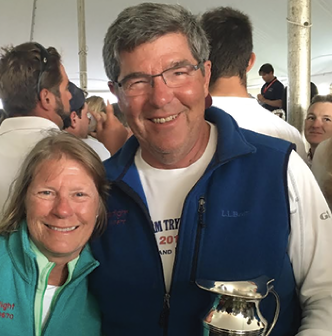
John de Regt – Moderator – A Storm Trysail member for more than 45 years and a life-long sailor, John and his wife Joan cruise their Cambria 46 Starlight. Following combat service as a Surface Warfare Officer in the US Navy, John spent 35 years in executive Leadership training. Facilitated by John, each panelist brought a unique perspective to the concept of Leadership with the following outtakes indicative of their engaging presentations. Graduate - Dartmouth College, SUNY Maritime, and NYU

Susan Blank – MD, MPH, CAPT, USPHS (ret.) – Capt. Blank recently retired after 30 years of active duty as a Commissioned Officer with the United States Public Health Service. Her career included extensive public health and multiple collateral duty assignments such as serving as deputy incident commander in NYC, CDC and USPHS, plus deployments in such varied circumstances as 9/11, Anthrax, COVID-19, and Super Storm Sandy in NYC. Graduate - Massachusetts Institute of Technology, University of Pittsburgh, Columbia University
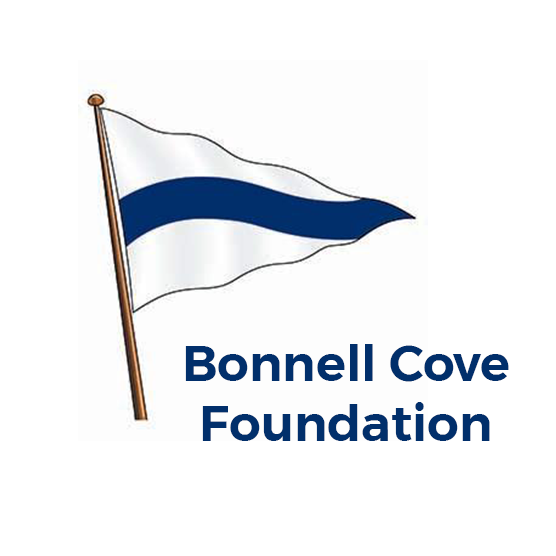
Susan addressed Leadership from the public health perspective. Organizing an effective response to the outbreak of COVID in New York City demanded a massive effort which in turn required extraordinary Leadership. Leadership requires clarity of mission, communication, transparency, honesty, and mutual respect, she said. She emphasized that while the team members focused on assigned tasks, the Leader assures coordination across tasks, and maintained situational awareness in order to direct modifications as needed. For her, the art of leading requires “soft skills”: A positive attitude, humility (clearly owning your mistakes) and a sense of humor, as well as the science of critical thinking, checking and rechecking inputs and outputs. In practice, it incorporates frequent drills, building-in redundancies, including redundancy of skills.
- “Leadership is the art of motivating a group of people to achieve a common goal.”
- “Women tend to be less over-confident than men, perhaps because they are used to questioning themselves. When you feel confident, don’t rest on it. Go back to your checklist of what’s important and what are your goals.”
- “You have to be constantly identifying and developing Leaders. Organizations need redundancy of skills.”
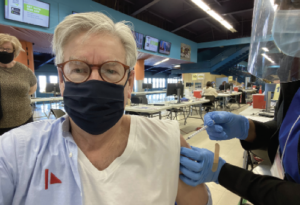
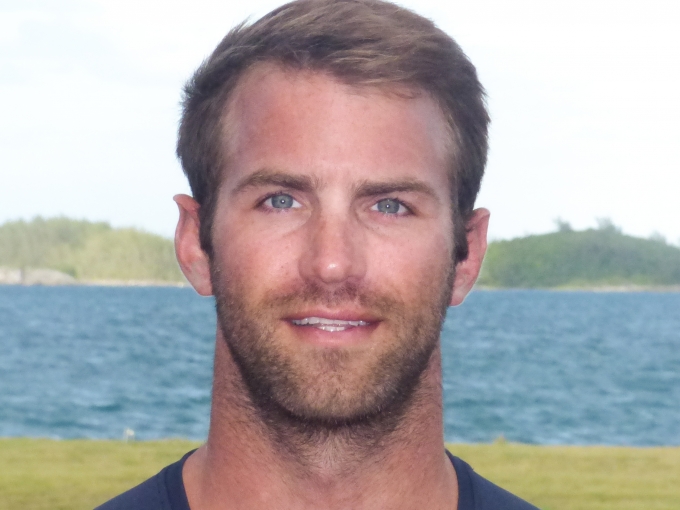
Walker Potts – Walker began his career as a Marine with multiple combat deployments as an infantryman and a Recon Marine in a special operations unit. After his service was complete, he participated in mountain helo-rescue operations. Walker has since returned to ocean racing as a rescue swimmer and professional sailor covering over 40,000 miles. Graduate – University of Connecticut
Walker brought the perspective of intense combat to the conversation. He emphasized that Leadership is not just for the Leader. “In our combat teams, everyone, from most senior to most junior, had the responsibility to say something if you see something.” He used the term “deep in the grind” to describe long-duration intense periods, such as days in combat or rough weather at sea. Walker discussed transforming potentially negative emotions, such as anger, into positive outcomes.
“Loyalty to those below you is just as important as loyalty to those above you.”
“Whether in combat like Fallujah, or at sea after days of heavy weather, it might be necessary to channel anger or other emotions into a useful purpose.”
Walker, a former U.S. Marine, shared the Corps’ acronym for their 14 Leadership characteristics: JJDIDTIEBUCKLE. (See image below)


Capt. Stephen Polk – A professional master mariner, Stephen has over 10,000 hours watch standing experience on ocean-going tugs and a wide variety of commercial vessels. A U.S. Navy combat veteran of Operation Iraqi Freedom, Captain Polk now supervises the Seamen’s Church Institute Center for Maritime Education. Graduate – Texas A&M at Galveston
Stephen discussed the importance of smooth functioning of the team on a ship’s bridge, and the critical importance of trust between the Leader and the team. He began with the interesting example of a harbor pilot, who may be female, in charge of bringing a ship safely to its berth, when the captain and crew come from ethnicities in which women never give orders. Leadership in that circumstance requires knowledge, confidence, tact, and authority. He also emphasized the importance of clear, easily understood communication in any situation.
- “What happens when the Leader is not who you expect.”
- “A good Leader puts the crew first.”
- “A good Leader has humility: none of us is as good as all of us.”

Eric Simonson – Eric has been a professional mountain guide since 1973 and personally conducted over 100 major expeditions around the globe, including over 30 to the Himalayas. His climbing resumО includes expeditions on every continent of the globe, including ascents of the “Seven Summits” and eleven expeditions to Mt. Everest, reaching the summit in 1991 via the North Ridge. Graduate – Carleton College
Ericbrought the perspective of mountain climbing to the discussion. Having vast experience as a mountaineering guide, he made the interesting observation that the entire team has the responsibility to check each other, which echoed the comment of Walker Potts. Eric compared the sea and mountains by commenting, “Both the sea and mountains are awesome, beautiful places, which can turn deadly with no warning. Enjoy them but be ready. You can teach technical skills, but it’s the personal skills that are tough.”
- “Whether you are in the mountains or on a boat, you are far from home in an unforgiving environment.”
- “We’re always watching each other for safe practices. We normalize this so no one takes it as a personal affront.”
- “A Leader must understand individuals’ personal limitations, and know what people bring to the table.”
- “Don’t be afraid to change your mind as circumstances change. It’s not a matter of losing face.”
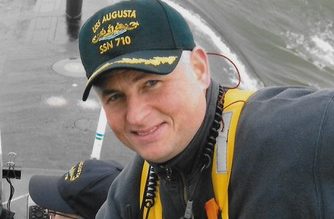
James Childs, Capt., USN (ret.) – A career nuclear submarine officer, James commanded the USS AUGUSTA (SSN 703) and two submarine squadrons. After several significant shore tours, he retired from active service yet continues to work with the Submarine Force as a senior tactical and mariner skills trainer, advisor and mentor for submarine officers at all levels. Graduate – United States Naval Academy
James emphasized that one of a Leader’s prime responsibilities is to develop Leaders, a comment also made by several panelists. He echoed Todd Gautier’s point that Leadership style is situational. Being an empathic, caring, humble Leader when the situation is normal gives the Leader the standing to give orders when the situation demands. He spoke these points:
- “Good Leaders develop other good Leaders.”
- “Are you a mentor or driver? There’s an appropriate time for each.”
- “Humility allows a Leader to be self-aware and empathetic, to get the team where they want them.”
- “Know yourself and know your people.”
- “A Leader needs confidence, to allow subordinates to fail and learn.”
- “Good Leaders develop their replacements. Bad Leaders don’t. If the Leader goes down, things can go into a death spiral.”

Todd Gautier – Todd is president of the Aviation Systems Segment of L3Harris Technologies – the sixth largest defense company in the U.S. with 50,000 employees. Previously, he flew for United Airlines. While in the U.S. Navy, Todd flew F/A-18 strike fighters in combat operations, was an instructor and was responsible for standardizing Naval Aviation Strike Warfare Tactics. Graduate – Southern Methodist University
Todd discussed Leadership from the perspectives of naval officer, airline flight crew, and senior corporate executive. He likened Leadership to being a craftsman who has a bag filled with many tools, each of which has a specific use. Sometimes Leadership demands that the Leader allow a subordinate to fail, in order for that person to learn. In that example, Todd said, the Leader needs great patience. At other times, for example in airborne emergencies, crisp orders are necessary to save lives. He repeatedly talked about the importance of the team, and the Leadership mandate of constantly developing the next generation of Leaders, making these points:
- “Different manners of Leadership skills are required for the three types of operations: 1) normal/low-risk operations, 2) ambiguous operations, and 3) emergency/high-risk/time critical operations.”
- “I am a recovering poor Leader.” Todd always strives to identify what it takes to be a better Leader.”
- “The key for me is knowing that although I may not be the smartest person in the room, my team makes that up for me.”
- “I’ve learned more from bad Leaders than good Leaders.”
- “Bad Leaders don’t know what they don’t know.”
- “If you are not in danger, let an over-confident subordinate try and fail. It’s a great way to both teach and learn.”
- “It’s a Leader’s job to plan for succession in case the Leader goes down.”

Low or No EQ
Todd also noted that 75% of careers are derailed for reasons related to emotional competencies, including inability to handle interpersonal problems, unsatisfactory team Leadership during times of difficulty or conflict, or inability to adapt to change or elicit trust.
